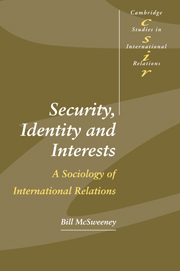1 - The meaning of security
Published online by Cambridge University Press: 22 September 2009
Summary
Security, it was noted, is an elusive term. Like peace, honour, justice, it denotes a quality of relationship which resists definition. It has an active verbal form which seems to take it out of the realm of the abstruse, and a hard tangibility in its nominal form which promises something solid and measurable. But it eludes the attempt to capture it, to enclose it. It is a ubiquitous term, pressed into servicing young and old, rich and poor, the experience of the mundane and analysis of the affairs of state. Where to begin to look for its meaning, and whether it makes sense to expect a unitary meaning basic to all usages, are a challenge which calls for the joint labours of history and philosophy.
There are two images which come to mind when we think of the word. The noun ‘security’ evokes the picture of a solid object, like a lock, alarm, or weapon used to protect or defend against intrusion or attack. Or it denotes an investment in property, shares, pension – in some cultures, children. When such instruments or investments are in place, we imagine, ‘security’ as inner experience is the consequence. When the house is guarded, the street is policed, the shares are purchased, then we feel safe, defended against the indeterminate actions of others.
On the other hand, this activity may have a quite different consequence: our display of ‘security’ also displays vulnerability and makes us feel unsafe.
- Type
- Chapter
- Information
- Security, Identity and InterestsA Sociology of International Relations, pp. 13 - 22Publisher: Cambridge University PressPrint publication year: 1999
- 1
- Cited by

